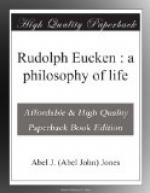The solutions of the problem of life that have been offered he considers to be five—Religion and Immanental Idealism, Naturalism, Socialism and Individualism, the first two regarding the invisible world as the reality in life, the others laying emphasis on man’s life in the present world. The reader will perhaps wonder how his choice has fallen upon these systems of thought and these alone. The explanation is a simple one: he considers it necessary to deal only with those theories which can form, and have formed, bases for a whole system of life. Mere theoretical ideas of life, especially negative ideas such as those of agnosticism and scepticism, do not form such a basis, but the five chosen for discussion can, and have to some extent, posed as complete theories of life, upon which a system of life can be built.
Has Religion solved the question? If it has, then it must have done so in that which must be considered its highest form—in Christianity. Christianity has attempted the solution by placing stress upon a higher invisible world, a world in sharp contrast with the mere world of sense, and far superior to it. It unites life to a supernatural world, and raises mankind above the level of the natural world. It has brought out with great clearness the contrast between the higher world and the world of sin, and has shown the need for a break with the evil in the world. It has given to man a belief in freedom, and in the necessity for a complete change of heart. It has proved a source of deliverance from the feeling, of guilt, and a comfort in suffering. Indeed, considering all the facts, there seems to be no doubt that, of all the solutions offered, religion has been the most powerful factor in the history of mankind.
Its influence would continue for the present and future, were it not that doubt has been cast upon its very foundations, and had not circumstances arisen to take men’s minds away from thoughts of a higher and invisible world, and to concentrate them to a greater extent than formerly upon the world of sense. The progress of the natural sciences has done much to bring about the change. Christianity made man the centre of the universe, for whom all things existed, but the sciences have insisted upon a broader view of the universe, and have deposed man from his throne, and given him a much humbler position. Then as the conception of law became more prominent, and scientists became more and more inclined to explain all things as the result of natural laws, the idea of a personal God in constant communion with, and supervision over mankind, fell into disfavour.
And the study of history has caused questions to be raised. Some historians have endeavoured to show that the idea of an overworld is merely the characteristic of a certain stage in the evolution of mankind, and that the ideas of religion are, after all, little more than the mental construction of a God upon the image of man’s own self. History has attacked the doctrinal form of religion, and has endeavoured to show that religions have been very largely coloured and influenced by the prevailing ideas of the time; and the question naturally arises as to whether there is anything more in religion than these temporary elements.




